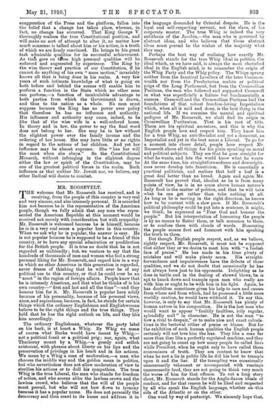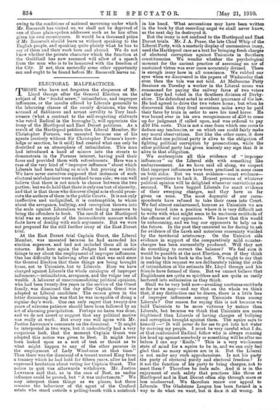MR. ROOSEVELT. T HE welcome that Mr. Roosevelt has received, and
is receiving, from the people of this country is very real and very sincere, and also intensely personal. It is accorded him not because he is the representative of the American people, though we fully admit that any man who repre- sented the American Republic at this moment would be received not merely with consideration but with sympathy. Mr. Roosevelt is welcomed because he is himself, because he is in a very real sense a popular hero in this country. When we ask why he is popular, the answer is easy. He is not popular because he is supposed to be a friend of this country, or to have any special admiration or predilection for the British people. It is true no doubt that he is not regarded as unfriendly; but. we venture to say that the hundreds of thousands of men and women who feel a strong personal liking for Mr. Roosevelt, and regard him in a way in which no other American in this generation is regarded, never dream of thinking that he will ever be of any political use to this country, or that he could ever be an " asset " in the region of foreign affairs. People know that he is intensely American, and that what he thinks of is his own country—" first and last and all the time "—and they honour him for it. Mr. Roosevelt is popular here solely because of his personality, because of his personal views, aims, and aspirations, because, in fact, he stands for certain things which the ordinary Englishman and Englishwoman believe to be the right things and the true things. They hold that he has the right outlook on life, and they like him accordingly.
The ordinary Englishman, whatever the party label on his back, is at heart a Whig. By Whig we mean of course what Burke would have meant by Whig,— not a political fossil or a, political prig; nor, again, what Thackeray meant by a Whig,—a greedy and selfish aristocrat, with phrases about liberty on his lips and the preservation of privilege in his heart and in his actions. We mean by a Whig a man of moderation,—a man who chooses the middle way and the golden mean in politics, but who nevertheless does not allow moderation of view to sterilise his actions or to dull his sympathies. The true Whig is the true Liberal, the man who stands for freedom of action, and who scorns alike the lawless crown and the lawless crowd, who believes that the will of the people must prevail, but who will not bow down to tyranny because it has a popular name. He does not personify the democracy and then crawl to its knees and address it in the language demanded by Oriental despots. He is the loyal and self-respecting servant, not the slave, of his corporate master. The true Whig is indeed the very antithesis of the Jacobin,—the man who is governed by abstract ideas, and who believes that those abstract ideas must prevail be the wishes of the majority what they may.
Perhaps the best way of realising how exactly Mr. Roosevelt stands for the true Whig ideal in politics, the ideal which, as we have said, is always the most cherished ideal in the English mind, is to remember the origin of the Whig Party and the Whig policy. The Whigs sprang neither from the fanatical Levellers of the later Common- wealth nor from the Presbyterian zealots or political prigs of the Long Parliament, but from the Cromwellian Puritans, the men who followed and supported Cromwell in what was superficially a failure but fundamentally a success. Cromwell and the Cromwellian Puritans laid the foundations of that robust freedom-loving Imperialism which, when all is said and done, is the best thing in the national life. If we examine the mental and spiritual pedigree of Mr. Roosevelt, we shall find its origin in Cromwellian Puritanism. That is his root of title. There are his spiritual ancestors, and this is why the English people love and respect him. They know him for a true Whig, an anti-Socialist and yet a democrat, an Imperialist and yet in the best sense a Liberal. To go for a moment into closer detail, people here respect Mr. Roosevelt above all things for his plain speaking on moral and political subjects. They see that he goes straight for what he wants, and lets the world know what he wants. At the same time, his straightforwardness and downright- ness never develop into fanaticism. He is essentially a practical politician, and realises that half a loaf is a great deal better than no bread. Again and again Mr. Roosevelt has proved that, idealist as he is from many points_of view, he is in no sense above human nature's daily food in the matter of politics, and that he will take what he can get rather than take nothing at all. As long as he is moving in the right direction, he knows how to be content with a slow pace. If Mr. Roosevelt's political philosophy could be put into a sentence, it might, we think, be expressed as " Fear God and honour the people." But his interpretation of honouring the people is by no means to flatter them, or talk nonsense to them. or to confuse them with clouds of words. Honouring the people means first and foremost with him speaking the truth to them.
But though English people respect, and, as we believe, rightly respect, Mr. Roosevelt, it must not be supposed that either they or we desire to meet him with " a foolish face of praise." He has made in his time plenty of mistakes and will make plenty more. His straight- forwardness and impulsiveness have the defects of those qualities, and we do not doubt that occasionally he has not always been just to his opponents. Delighting as he does in battle and in the dealing of shrewd blows, he is apt to knock down and trample upon men who really are with him or ought to be with him in his fight. Again, he has doubtless sometimes given his help to men and causes from whom and from which, had be possessed a little more worldly caution, he would have withheld it. To say this, however, is only to say that Mr. Roosevelt has plenty of human nature in his composition. He is the last man who would want to appear " faultily faultless, icily regular, splendidly null " in character. He is not the man " to bow a rival to despair," or to make nice and exact calcula- tions in the bestowal either of praise or blame. But for the exhibition of such human qualities the English people certainly will not love him the less. They like a man far more than they like a perfectly regulated machine, and they are not going to count up how many people he called liars while President, when he ought only to have called them economisers of truth. They are content to know that when he met a lie in public life he did. his best to trample upon it and the liar. If the trampling was occasionally unnecessarily vehement or accompanied with roarings unnecessarily loud, they are not going to think very much the worse of him for that offence. To cut a long story short, Mr. Roosevelt stands for the Anglo-Saxon ideals of conduct, and for that reason he will be liked and respected by all who speak the English language, whether on-this side of the Atlantic or on the other.
One word by way of postscript. We sincerely hope that, owing to the conditions of national mourning under which Mr. Roosevelt has visited us, we shall not be deprived of one of those plain-spoken addresses such as he has often given his own countrymen. It would be a thousand pities if Mr. Roosevelt should leave us without speaking to the English people, and speaking quite plainly what he has to say of them and their work here and abroad. We do not know whether the private character which the function at the Guildhall has now assumed will allow of a speech from the man who is to be honoured with the freedom of the City. If not, then assuredly some other opportunity can and ought to be found before Mr. Roosevelt leaves us.







































 Previous page
Previous page